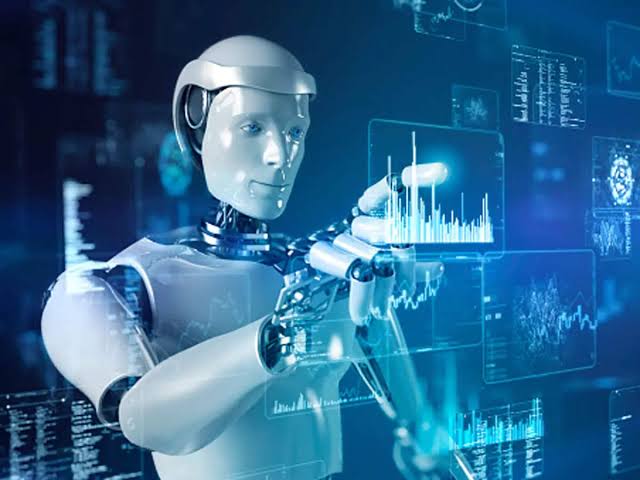If you’ve ever used Uber or your phone’s auto-correct feature, you’ve used artificial intelligence. It seems that “artificial intelligence” (AI) is everywhere these days, but what does it actually mean? How does it benefit us in our daily lives?
Artificial intelligence’s effects on our daily lives can be determined by understanding it. Artificial intelligence (AI) is a computer’s or machine’s ability to learn, solve problems, make decisions, and understand natural language.
The entire process is automated. Automated systems that are “artificially intelligent” can learn from how they have been used before and change their responses to fit the user’s needs or try to get them to change their habits. This is just a very brief explanation of what artificial intelligence is; of course, there is much more to say.
Machine learning, deep learning, and natural language processing are crucial to AI. Machine learning is the process by which computers can get better at what they do by looking at large, structured data sets and getting feedback from humans and other ML systems on a regular basis.
Deep learning is thought to be the most advanced type of machine learning because it learns by looking at examples. Nevertheless, it can use unstructured data. Natural Language Processing is a computer-science linguistic technique. It enables voice recognition by machines. Computers perceive and respond to human input using natural language processing.
Read also: Nigeria Launches Africa’s First Humanoid Robot, Omeife
Real-World Applications of AI
Technologies based on artificial intelligence (AI) are being used in a variety of fields to improve output, accuracy, and user experience. Typical applications of artificial intelligence (AI) include the following:
Navigation with Maps
Travelling is easier because of AI. Today, you can use Waze, Google, or Apple Maps on your phone to get around. How does an app decide where to go? The best route: roadblocks or gridlock? Satellite-based GPS was the only option until AI was added to improve service.
Algorithms for machine learning that remember the edges of buildings make it easier to read and understand the house and building numbers and make maps look better. The app can also tell when traffic patterns change and suggest a different route to take to avoid slowdowns and traffic.
Face-Recognition Technology and Applications
AI is already in use when we use virtual filters on our faces when taking pictures and when we use the facial ID to open our phones. The first one has face detection, which lets it recognize any human face, while the second one uses technology that lets it recognize specific human faces. Additionally, surveillance and security systems at government buildings and airports employ facial recognition technology.
Text-editing and auto-correction apps
Using AI technologies that combine machine learning, deep learning, and natural language processing, your typing mistakes will be fixed in word processors, texting apps, and other places where you type. Linguists and computer scientists teach machines grammar like humans. The editor flags inappropriate comma usage because high-quality language data trains the algorithms.
Search-Recommendation Algorithms
Have you noticed that movie and shopping suggestions are often based on what you like or what you’ve been looking for recently? After watching how you use the Internet for a while, these smart recommendation systems will make suggestions based on what they know about you and what you like. Machine learning and deep learning are used to store and analyze the data that is collected at the front end. It can then guess what you like based on what it knows about you and suggest products, music, and more.
Chatbots are programmed to speak like customer care employees using natural language processing (NLP). More than just yes-or-no questions, modern chatbots can handle a range of inputs. Thus, they can answer complex problems. If you don’t like a bot’s answer, it will fix it next time to keep customers pleased.
Social media apps are using artificial intelligence (AI) more and more to monitor content, suggest relationships, and show ads based on certain criteria. This is done to keep users interested and “plugged in.”
AI systems can quickly find and remove content that doesn’t follow the terms of service by looking for keywords and recognizing pictures. This approach heavily employs deep learning’s neural network design.
As a result, social media platforms use AI to match users with businesses that have determined that they would be interested in advertising to them based on their profiles. Social media AI may also learn what users like and recommend more of it.
Electronic or digital payments
Financial institutions are now using AI to improve the customer experience by making it easier for people to pay.
Due to the use of AI for security, identity management, and privacy controls, it is now possible to open accounts, make deposits, and transfer money from anywhere in the world.
Credit card fraud can be found by keeping an eye on how people spend their money. That, too, is an example of AI. Algorithms can figure out how much money a user has to spend based on their buying habits, such as what they buy, how often they buy it, and where they buy it.
AI is often in the news, and these uses show why. These are just a few of the many ways AI is used. AI affects every part of our lives. It leads to the creation of cutting-edge technology.




